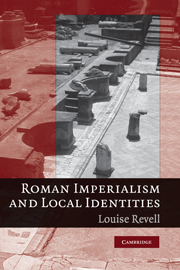2 - Living the Urban Ideal
Published online by Cambridge University Press: 18 December 2009
Summary
URBANISM AS IDEOLOGY
At Wroxeter, sometime around ad 160, a fire broke out damaging the forum and surrounding buildings. Excavation of the destruction layers revealed stacks of mortaria, nests of terra sigillata and a substantial pile of whetstones, all in the deep drain running along the front portico of the forum (Atkinson 1942: 63–4; see Figure 2.1). Grooves in the bases of some of the columns suggest that wooden stalls were set up here, and that the material in the drain represents the wares on sale at these stalls. Within the basilica, debris from the fire was also found in room 1 in the rear range, including lock plates, padlocks, bolts, keys and a sigillata inkpot, which, when taken together, suggest a number of lockable wooden chests or cupboards. This room may have been a tabularium or archive, and the people using this room may have been involved in keeping the town records and accounts (Hassall 2003); this would also account for the military diploma found in the same room (RIB 2.2401.8). This archive, taken with the census and payment of taxes, would have given the basilica a central role in the administration of the area. Here we can see how the ideal of Roman urbanism was more than an ephemeral concept for the people of the empire, but a fundamental part of their everyday existence.
- Type
- Chapter
- Information
- Roman Imperialism and Local Identities , pp. 40 - 79Publisher: Cambridge University PressPrint publication year: 2008

